Ramadan Again
It is Ramadan again. I was watching the BBC news last night and yet more horrors from Iraq when they commented that it was particularly sad that this atrocity had happened on the first day of Ramadan.
That woke me up. I was horrified. We always feed our guards for Ramadan and I hadn't taken out a tray. I sat there all evening feeling guilty.
This morning I rolled over and turned off the alarm on my mobile phone. I woke up, had a shower and came down to eat breakfast and have a coffee and have all food out of the way before my staff arrived. I hate eating around people who are fasting and all my staff are Moslem.
My housekeeper was really surprisingly late. I greeted her when she came in and told her I had just been getting worried. She pointed out that it wasnot late -she was actually early but that the time had changed on Thursday.
For the last three days I have been an hour out of kilter with the rest of the world and I didn't even notice!
Then I apologised as I hadn't realised the day before was Ramadan. "No", she said. "First day is today" - except in countries to the east.
Special Ramadan lamps have been going up all over the city. Every building is lit and some have great strings of lights on them. The feeding stations are out and that means that many small streets are closed so tables can be placed in them as evening approaches.
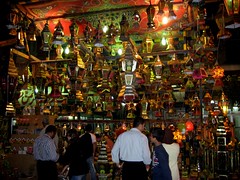
These are Ramadan lamps for sale in my very favourite area near the Tentmakers' Khan. At night they glow with the lift to the heart of a parade with drums. They are hard to photograph, and better with light coming through them than they are in the light of day, where they can look quite glitzy. Like Cairo, they look better at night.
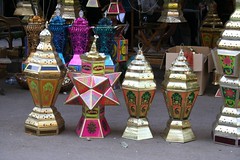
I love the ones with points like a Gaultier bra. They are really very cheap and one of a decent size is about ten dollars.
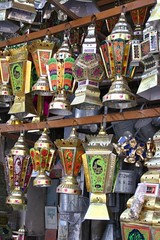
I have heard complaints that Egypt does not recycle its rubbish. While there is no formal separation of paper from glass and plastics, there is the constant recycling that comes with a very poor society. These boxes are some of my favourites. there are several men, all old and fragile and looking as if they are slowly drying down like dried bananas, who sit all day cutting out old tins that hold glues and industrial chemicals.
The chemicals and glues are dried and peeled out in long strips, and the tin cut into small pieces and fashioned into brightly coloured money boxes. These sell for so little it is almost embarrassing - about seventy five cents each. It would take half an hour to make a box.
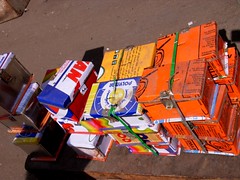
A slow walk up from port Said Street towards Bab Zuweilah takes you past so many wonderful shops and craftsmen.
Spices and dried pulses are sold in open sacks, and the scoops used are fashioned by the tinsmith next door.
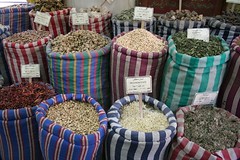
This extraordinary machine is made to roast sweet potatoes. Coals are built up inside and potatoes placed around the rack above them and carefully turned for perfect roasting. When they are ready they are taken out and stacked around the chimney to keep warm. The fingers in the air have a double purpose - five Egyptian pounds for a large potato (though you can negotiate if it is small, burnt, or at the end of the day), and a rod to lock the door closed. The hand is also good luck.
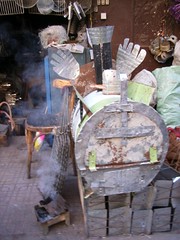
Sweet potatoes here are served as a dessert and never as part of a main course. It was quite disconcerting to order a restaurant's 'special' dessert to find I had a baked sweet potato with one scoop of ordinary white sauce on top.
There is an area where whole treetrunks lie around waiting to be turned into chairs and tables, and bowls and planter stands - you think of it and they will make it. they work with bare hands and sandals and open whirring saw blades - horrifying to a previous safety officer!
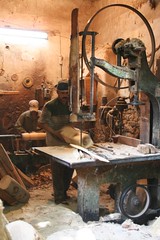
Coopers use the same wood to make barrels and planter pots.
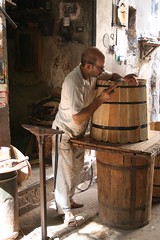
Finer woodwork is just around the corner with carved chairs, tables and the most enormous cupboards. I know very few of the local five and six and seven story buildings have lifts, so these have to be carried all the way up if they are purchased. Even in quite wealthy areas very few buildings will permit you to use lifts to carry furniture or refrigerators, so teams of labourers heft these up multiple flights of stairs.
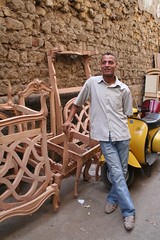
This man was sanding scratched and used sheets of glass - and he and everything within fifty feet was covered with fine red rosin.
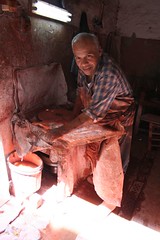
The leather souk sells dyed skins. The man on the right also shows another thing that is particularly obvious around Ramadan - and Egypt is the only place I have seen it. Many men here have large discolourations on their foreheads from consistent and frequent praying. Sometimes it is really raised and lumpy.
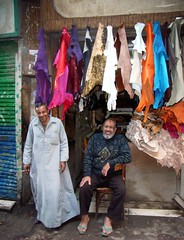
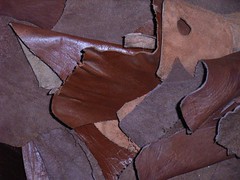
The last location for today. This is the Tentmakers' Souk, where men sit crosslegged on benches appliqueing stunning Islamic patterns onto a soft thick cotton ground. The patterns are very varied and rich, and colours are stunning. Egypt grows the best cotton in the world, but it is all exported to be spun in India and Pakistan. the cotton used by these men is cheap, bright and hard to work with (I've tried). They work with huge iron sheers, and none of the modern gadgets quilters of today are so fond of.
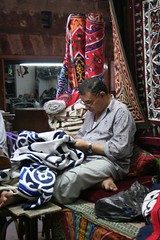
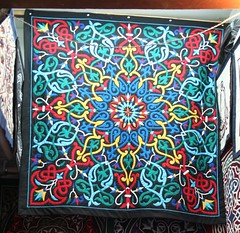
This is work by my friend Mohammed - one of the most skilled in the Souk. Watch for him in Melbourne this year at the Australasian Quilt Convention.
See - I have my photographs working again!
That woke me up. I was horrified. We always feed our guards for Ramadan and I hadn't taken out a tray. I sat there all evening feeling guilty.
This morning I rolled over and turned off the alarm on my mobile phone. I woke up, had a shower and came down to eat breakfast and have a coffee and have all food out of the way before my staff arrived. I hate eating around people who are fasting and all my staff are Moslem.
My housekeeper was really surprisingly late. I greeted her when she came in and told her I had just been getting worried. She pointed out that it wasnot late -she was actually early but that the time had changed on Thursday.
For the last three days I have been an hour out of kilter with the rest of the world and I didn't even notice!
Then I apologised as I hadn't realised the day before was Ramadan. "No", she said. "First day is today" - except in countries to the east.
Special Ramadan lamps have been going up all over the city. Every building is lit and some have great strings of lights on them. The feeding stations are out and that means that many small streets are closed so tables can be placed in them as evening approaches.

These are Ramadan lamps for sale in my very favourite area near the Tentmakers' Khan. At night they glow with the lift to the heart of a parade with drums. They are hard to photograph, and better with light coming through them than they are in the light of day, where they can look quite glitzy. Like Cairo, they look better at night.

I love the ones with points like a Gaultier bra. They are really very cheap and one of a decent size is about ten dollars.

I have heard complaints that Egypt does not recycle its rubbish. While there is no formal separation of paper from glass and plastics, there is the constant recycling that comes with a very poor society. These boxes are some of my favourites. there are several men, all old and fragile and looking as if they are slowly drying down like dried bananas, who sit all day cutting out old tins that hold glues and industrial chemicals.
The chemicals and glues are dried and peeled out in long strips, and the tin cut into small pieces and fashioned into brightly coloured money boxes. These sell for so little it is almost embarrassing - about seventy five cents each. It would take half an hour to make a box.

A slow walk up from port Said Street towards Bab Zuweilah takes you past so many wonderful shops and craftsmen.
Spices and dried pulses are sold in open sacks, and the scoops used are fashioned by the tinsmith next door.

This extraordinary machine is made to roast sweet potatoes. Coals are built up inside and potatoes placed around the rack above them and carefully turned for perfect roasting. When they are ready they are taken out and stacked around the chimney to keep warm. The fingers in the air have a double purpose - five Egyptian pounds for a large potato (though you can negotiate if it is small, burnt, or at the end of the day), and a rod to lock the door closed. The hand is also good luck.

Sweet potatoes here are served as a dessert and never as part of a main course. It was quite disconcerting to order a restaurant's 'special' dessert to find I had a baked sweet potato with one scoop of ordinary white sauce on top.
There is an area where whole treetrunks lie around waiting to be turned into chairs and tables, and bowls and planter stands - you think of it and they will make it. they work with bare hands and sandals and open whirring saw blades - horrifying to a previous safety officer!

Coopers use the same wood to make barrels and planter pots.

Finer woodwork is just around the corner with carved chairs, tables and the most enormous cupboards. I know very few of the local five and six and seven story buildings have lifts, so these have to be carried all the way up if they are purchased. Even in quite wealthy areas very few buildings will permit you to use lifts to carry furniture or refrigerators, so teams of labourers heft these up multiple flights of stairs.

This man was sanding scratched and used sheets of glass - and he and everything within fifty feet was covered with fine red rosin.

The leather souk sells dyed skins. The man on the right also shows another thing that is particularly obvious around Ramadan - and Egypt is the only place I have seen it. Many men here have large discolourations on their foreheads from consistent and frequent praying. Sometimes it is really raised and lumpy.


The last location for today. This is the Tentmakers' Souk, where men sit crosslegged on benches appliqueing stunning Islamic patterns onto a soft thick cotton ground. The patterns are very varied and rich, and colours are stunning. Egypt grows the best cotton in the world, but it is all exported to be spun in India and Pakistan. the cotton used by these men is cheap, bright and hard to work with (I've tried). They work with huge iron sheers, and none of the modern gadgets quilters of today are so fond of.


This is work by my friend Mohammed - one of the most skilled in the Souk. Watch for him in Melbourne this year at the Australasian Quilt Convention.
See - I have my photographs working again!


0 Comments:
Post a Comment
<< Home